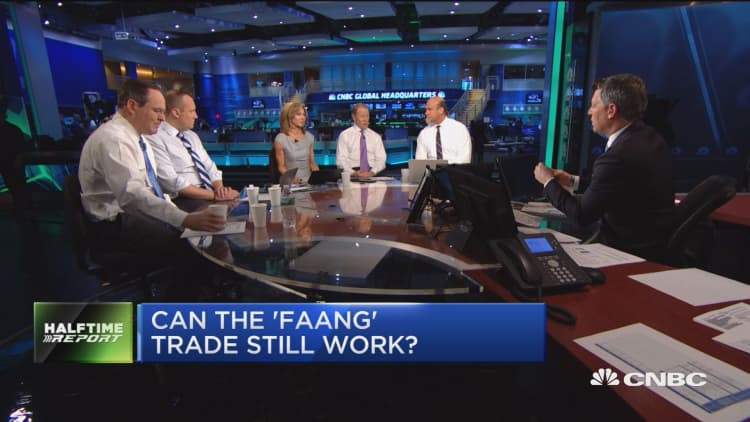So far, 2018 has been a bumpy road for stocks. The Major averages soared to record highs in January, propelled upward by strong fourth-quarter earnings and broader market-momentum after stocks closed 2017 for their best year since 2013.
But just a few months can make quite the difference. Volatility returned in a big way halfway through Q1 as Washington turned its focus to tariffs. Fears of a full-blown trade war and a lack of clarity from the White House pressured stocks. The Dow and S&P 500 ultimately ended the quarter lower.
But despite the perceived risk in the market, a majority of Wall Street's top strategists think the jitters are only temporary and that stocks will once again eke out gains for the year.
Seventy-three percent of respondents in CNBC's exclusive "Halftime Report Stock Survey" said they believe the will finish the year at least five percent higher than current levels.
As of Thursday's close, the index was trading at 2,662, so a gain of five percent would put it at 2,795 by year-end. This does, however, fall below the index's all-time closing high -- 2,872.87 -- hit on January 26 before investors turned skittish on rising yields, higher inflation, the threat of mounting trade wars, and a weak dollar.
Rising rates can be a warning sign for equities, but a majority of Street strategists think the yield on the U.S. 10-year treasury would have to move sharply higher before negatively impacting stocks. Sixty-four percent of respondents believe 3.50% is the key level to watch.
The U.S. 10-year yield has risen forty-two basis points so far this year, closing at 2.83% on Thursday.
While overall sentiment on the street remains bullish, forty-one percent of strategists said they believe equities are overvalued. Thirty-five percent believe they're correctly valued, and twenty-four percent said they're cheap.
Technology is the best-performing S&P sector over the past year, and it is one of only two sectors registering gains so far in 2018. (Consumer Discretionary is also higher for the year.) Despite its outperformance and a sell-off triggered by Facebook's Cambridge Analytica scandal, technology remains a favored sector going forward. Seventy-eight percent of respondents said they still rate the sector "buy." Sixty-two percent like financials, with thirty-six percent also favoring industrials and energy.
Still, half of respondents did say they've become more bearish on tech stocks compared to their view at the beginning of the year. Many investors and strategists alike have pointed to the outsized impact of just five tech stocks on the overall sector. The so-called "FAANG" stocks -- Facebook, Amazon, Apple, Netflix, and Google -- account for a nearly forty percent weighting of the Nasdaq-100.

Stocks began the month on a low note, posting their worst start to April since the Great Depression. This followed a slowdown at the end of Q1 after President Trump's tariff announcements and fears of a trade war sent stocks tumbling. The Dow and S&P posted their first back-to-back negative months since October 2016, and they ended the quarter lower for the first time in the past nine quarters.
But despite the recent volatility and overall stock-market jitters, more than half of strategists think fears of a trade war are over-blown.
Sixty-four percent of respondents said they are not rethinking their year-end targets based on trade fears.
Strategists were mixed on what the top overall risk to the market might be. The highest percentage -- forty-three -- said a mix of inflation, extended valuations, credit deterioration, poor Washington visibility, and the Nasdaq's "FAANG" domination could pose a threat to the rally.
Twenty-one percent said rising rates are the single-biggest factor, while thirty-six percent highlighted a trade war.




